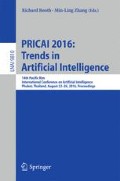Abstract
We develop inference procedures for a recently proposed model of probabilistic argumentation called PABA, taking advantages of well-established dialectical proof procedures for Assumption-based Argumentation and Bayesian Network algorithms. We establish the soundness and termination of our inference procedures for a general class of PABA frameworks. We also discuss how to translate other models of probabilistic argumentation into this class of PABA frameworks so that our inference procedures can be used for these models as well.
Access this chapter
Tax calculation will be finalised at checkout
Purchases are for personal use only
Notes
- 1.
Probabilistic values are made up for demonstration.
- 2.
\(ABA\,\mathcal F \vdash _{sem} \pi \) iff wrt this PABA framework, \(Prob_{sem}(\pi ) = 1\).
- 3.
- 4.
Preferred/grounded/ideal semantics.
- 5.
For convenience, define \(head(r) = l_0\) and \(body(r) = \{l_1,\dots l_n\}\).
- 6.
Any PABA framework in [5] is also an PABA framework in our extended definition, but the reverse may not hold.
- 7.
\(\lnot \) is the classical negation operator.
- 8.
In examples, we will not list complementary rules to save space.
- 9.
We will use this framework in running examples from now on.
- 10.
That is, each pair \(\alpha , \lnot \alpha \) of probabilistic assumptions of \(\mathcal P\) corresponds to truth assignments of variable \(\alpha \in V\) and vice versa; and each probabilistic rule in \(\mathcal R_p\) corresponds to one entry of an CPT in \(\mathcal N\) and vice versa.
- 11.
If \(\pi \) does not occur in \(\mathcal P\), then \(Prob_{sem}(\pi )=0\) for any semantics sem.
- 12.
From now on we assume an arbitrary but fixed \(PABA\,\mathcal P = (\mathcal A_p, \mathcal R_p, \mathcal F)\) with
 if not explicitly stated otherwise.
if not explicitly stated otherwise. - 13.
Silence about a component means it remains the same as the previous step. In this case 2.a.i, for example, \(A_{i+1} = A_i\) and \(C_{i+1} = C_i\).
- 14.
That is, neither \(\sigma \) nor its complement are elements of \(\omega \).
- 15.
\(\mathcal A\) is the set of assumptions in \(ABA\,\mathcal F\).
- 16.
That is, \(Prob_{gr}(A) \triangleq \sum \limits _{\omega \in \mathcal W: (AR_{\omega }, Att \cap (AR_{\omega } \times AR_{\omega })) \vdash _{gr} A} P(\omega )\).
References
Doder, D., Woltran, S.: Probabilistic argumentation frameworks – a logical approach. In: Straccia, U., Calì, A. (eds.) SUM 2014. LNCS, vol. 8720, pp. 134–147. Springer, Heidelberg (2014)
Dung, P.M., Mancarella, P., Toni, F.: Computing ideal skeptical argumentation. Artif. Intell. 171(10–15), 642–674 (2007)
Dung, P.M.: On the acceptability of arguments and its fundamental role in nonmonotonic reasoning, logic programming and n-person games. Artif. Intell. 77(2), 321–357 (1995)
Dung, P.M., Kowalski, R.A., Toni, F.: Dialectic proof procedures for assumption-based, admissible argumentation. Artif. Intell. 170(2), 114–159 (2006)
Dung, P.M., Thang, P.M.: Towards (probabilistic) argumentation for jury-based dispute resolution. In: COMMA 2010, pp. 171–182 (2010)
Fazzinga, B., Flesca, S., Parisi, F.: On the complexity of probabilistic abstract argumentation frameworks. ACM Trans. Comput. Logic 16(3), 22:1–22:39 (2015)
Hunter, A.: A probabilistic approach to modelling uncertain logical arguments. Int. J. Approximate Reasoning 54(1), 47–81 (2013)
Li, H., Oren, N., Norman, T.J.: Probabilistic argumentation frameworks. In: Modgil, S., Oren, N., Toni, F. (eds.) TAFA 2011. LNCS, vol. 7132, pp. 1–16. Springer, Heidelberg (2012)
Thang, P.M., Dung, P.M., Hung, N.D.: Toward a common framework for dialectical proof procedure in abstract argumentation. J. Logic Comput. 19(6), 1071–1109 (2009)
Acknowledgment
This work was funded by SIIT Young Researcher Grant under Contract No SIIT-2014-YRG1.
Author information
Authors and Affiliations
Corresponding author
Editor information
Editors and Affiliations
Rights and permissions
Copyright information
© 2016 Springer International Publishing Switzerland
About this paper
Cite this paper
Hung, N.D. (2016). Computing Probabilistic Assumption-Based Argumentation. In: Booth, R., Zhang, ML. (eds) PRICAI 2016: Trends in Artificial Intelligence. PRICAI 2016. Lecture Notes in Computer Science(), vol 9810. Springer, Cham. https://doi.org/10.1007/978-3-319-42911-3_13
Download citation
DOI: https://doi.org/10.1007/978-3-319-42911-3_13
Published:
Publisher Name: Springer, Cham
Print ISBN: 978-3-319-42910-6
Online ISBN: 978-3-319-42911-3
eBook Packages: Computer ScienceComputer Science (R0)


 if not explicitly stated otherwise.
if not explicitly stated otherwise.